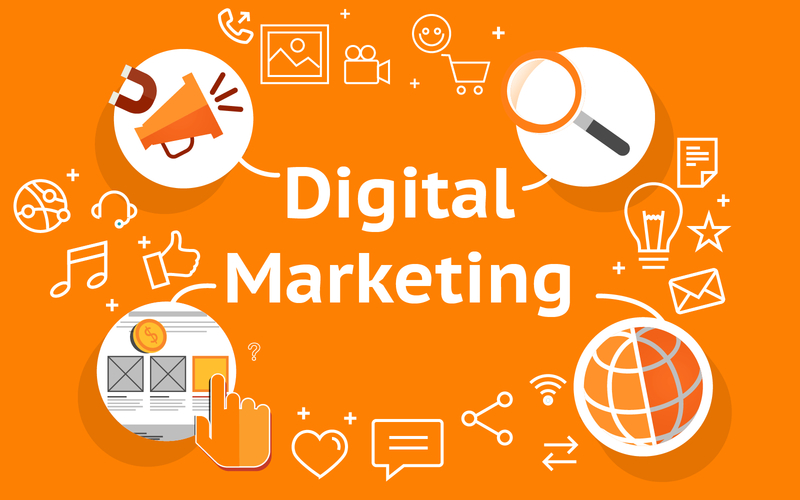In today’s fast-paced, interconnected world, digital marketing has emerged as a critical tool for businesses of all sizes. With the proliferation of smartphones, social media platforms, and online shopping, the way consumers interact with brands has fundamentally changed. Digital marketing offers a unique opportunity for businesses to reach their target audience, build brand awareness, and drive sales. In this article, we will explore the key aspects of digital marketing and discuss its potential for business growth.

- Understanding Digital Marketing
Digital marketing encompasses a broad range of strategies and tactics aimed at promoting products or services using digital channels. These channels can include websites, search engines, social media platforms, email, mobile apps, and more. Unlike traditional marketing, which often relies on one-way communication, digital marketing allows for real-time interactions, personalized messaging, and precise targeting.
- The Benefits of Digital Marketing
2.1. Increased Reach and Targeting
One of the significant advantages of digital marketing is its ability to reach a vast audience. With the internet’s global reach, businesses can connect with potential customers from all around the world. Additionally, digital marketing provides tools for precise targeting, enabling businesses to focus their efforts on specific demographics, interests, or behaviors. This targeted approach ensures that marketing efforts are more effective and efficient.
2.2. Cost-Effectiveness
Compared to traditional marketing methods such as TV ads or billboards, digital marketing is often more cost-effective. Many digital marketing strategies, such as social media marketing or email campaigns, have low entry costs and can be tailored to fit any budget. Additionally, digital marketing allows for better tracking and measurement of results, ensuring that businesses can allocate their resources more efficiently.
2.3. Improved Customer Engagement
Digital marketing facilitates two-way communication between businesses and their customers. Through social media platforms, online forums, or interactive websites, businesses can engage in conversations, gather feedback, and build relationships with their audience. This engagement fosters customer loyalty and creates opportunities for businesses to provide personalized experiences, ultimately leading to increased customer satisfaction and retention.
- Key Components of Digital Marketing
3.1. Search Engine Optimization (SEO)
SEO is the practice of optimizing a website’s content and structure to rank higher in search engine results. By implementing SEO strategies, businesses can increase their visibility and attract organic traffic from search engines like Google or Bing. This visibility is crucial, as studies have shown that users rarely go beyond the first page of search results. A higher ranking translates into increased website visits and potential conversions.
3.2. Social Media Marketing
Social media platforms have become powerful marketing tools, allowing businesses to connect with their target audience on a personal level. Through engaging content, influencer partnerships, and targeted advertising, businesses can build brand awareness, foster customer loyalty, and drive website traffic. Social media marketing also provides valuable insights into customer behavior, preferences, and trends, enabling businesses to refine their strategies further.
3.3. Content Marketing
Content marketing involves creating and distributing valuable, relevant, and consistent content to attract and retain a clearly defined audience. This content can take various forms, such as blog posts, videos, infographics, or ebooks. By providing useful and engaging content, businesses can establish themselves as industry experts, gain credibility, and nurture relationships with their audience. Content marketing also plays a vital role in SEO efforts, as high-quality content is more likely to attract backlinks and improve search rankings.
3.4. Email Marketing
Email marketing remains one of the most effective digital marketing channels for businesses. Through personalized and targeted email campaigns, businesses can nurture leads, build relationships, and drive conversions. Email marketing automation tools allow for sophisticated segmentation and personalization, ensuring that the right message reaches the right audience at the right time. Moreover, email marketing provides measurable results, allowing businesses to track open rates, click-through rates, and conversion rates.
3.5. Pay-Per-Click Advertising (PPC)
PPC advertising involves paying for each click on an online ad. This model is commonly used in search engine advertising, where businesses bid on keywords relevant to their products or services. When users search for those keywords, the business’s ad appears at the top of the search results, increasing visibility and driving targeted traffic to their website. PPC advertising offers precise targeting options, immediate results, and the ability to control ad spend.
- The Evolving Landscape of Digital Marketing
Digital marketing is an ever-evolving field, constantly influenced by technological advancements, changing consumer behavior, and industry trends. Here are some key trends and developments shaping the digital marketing landscape:
4.1. Artificial Intelligence (AI) and Machine Learning
AI and machine learning technologies are revolutionizing digital marketing. These technologies enable businesses to automate processes, analyze vast amounts of data, and deliver personalized experiences at scale. AI-powered chatbots, recommendation engines, and predictive analytics are just a few examples of how AI is being integrated into digital marketing strategies.
4.2. Video Marketing
Video content continues to gain popularity across digital platforms. Whether it’s short-form videos on social media or longer-form content on YouTube, businesses are leveraging video marketing to engage with their audience. Video content allows for storytelling, demonstrations, and immersive experiences, effectively capturing users’ attention and driving engagement.
4.3. Voice Search Optimization
With the rise of voice assistants like Siri, Alexa, and Google Assistant, optimizing for voice search is becoming increasingly important. Businesses need to adapt their SEO strategies to accommodate voice queries, which often differ from typed searches. Understanding natural language processing, long-tail keywords, and conversational content is crucial to succeed in voice search optimization.
Conclusion
Digital marketing has transformed the way businesses connect with their audience and promote their products or services. Its ability to reach a vast audience, engage customers, and provide measurable results makes it an indispensable tool for business growth in the digital age. By leveraging various digital marketing strategies, businesses can expand their reach, increase brand visibility, and drive conversions. However, it is essential to stay updated with the latest trends and continuously adapt to the evolving digital landscape to stay ahead of the competition.